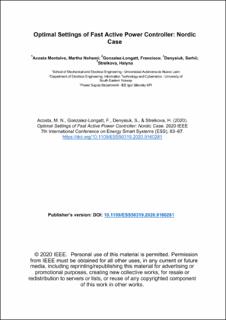| dc.contributor.author | Acosta Montalvo, Martha Nohemi | |
| dc.contributor.author | Gonzalez-Longatt, Francisco | |
| dc.contributor.author | Denysiuk, Serhii | |
| dc.contributor.author | Strelkova, Halyna | |
| dc.date.accessioned | 2021-06-14T09:02:08Z | |
| dc.date.available | 2021-06-14T09:02:08Z | |
| dc.date.created | 2021-01-27T17:17:32Z | |
| dc.date.issued | 2020 | |
| dc.identifier.citation | Acosta, M. N., Gonzalez-Longatt, F., Denysiuk, S., & Strelkova, H. (2020). Optimal Settings of Fast Active Power Controller: Nordic Case. 2020 IEEE 7th International Conference on Energy Smart Systems (ESS). | en_US |
| dc.identifier.isbn | 978-1-7281-9787-6 | |
| dc.identifier.uri | https://hdl.handle.net/11250/2759197 | |
| dc.description.abstract | The Nordic power system is continuously changing, and it has been experiencing a growing replacing of conventional power plants with renewable power plants, this together with other factors are causing reduction of the total inertia of the Nordic power system. The application of technologies that emulates the dynamic response of the synchronous generators has been a feasible solution. This paper focuses on finding the bests control adjustment of the fast-active power injection/absorption (FAPIA) model by using an optimization algorithm. The FAPIA model has two frequency sensible control actions: a proportional control (K-f) and a derivative control (K-df\dt). The optimization problem is defined using the gains of the proportional and derivative control together with the volume of FAPIA model contribution as decision variables. Two objective functions are determined based on two system frequency response indicators: minimum frequency, the and steady-state frequency. A simplified version of the Nordic power system is implemented for system frequency response studies. | en_US |
| dc.language.iso | eng | en_US |
| dc.relation.ispartof | 2020 IEEE 7th International Conference on Energy Smart Systems (2020 IEEE ESS) | |
| dc.title | Optimal Settings of Fast Active Power Controller: Nordic Case | en_US |
| dc.type | Chapter | en_US |
| dc.description.version | acceptedVersion | en_US |
| dc.rights.holder | © 2020 IEEE. | en_US |
| dc.source.journal | 7th International Conference on Energy Smart Systems (ESS) | en_US |
| dc.identifier.doi | https://doi.org/10.1109/ESS50319.2020.9160281 | |
| dc.identifier.cristin | 1880661 | |
| cristin.ispublished | true | |
| cristin.fulltext | original | |
| cristin.qualitycode | 1 | |
